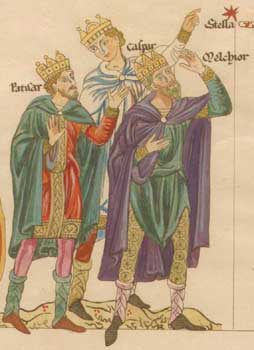Three Wise Men

The biblical Magi are also referred to as the Three Wise Men, (Three) Kings, and the Three Magi, were distinguished foreigners in the Gospel of Matthew and Christian tradition. They are said to have visited Jesus after his birth, bearing gifts of gold, frankincense, and myrrh. They are regular figures in traditional accounts of the nativity celebrations of Christmas and are an important part of Christian tradition.
Description
The Magi are popularly referred to as wise men and kings. The word magi is the plural of Latin magus, borrowed from Greek μάγος (magos), as used in the original Greek text of the Gospel of Matthew. Greek magos itself is derived from Old Persian maguŝ from the Avestan magâunô, the religious caste into which Zoroaster was born (see Yasna 33.7: "ýâ sruyê parê magâunô" = "so I can be heard beyond Magi"). The term refers to the Persian priestly caste of Zoroastrianism. As part of their religion, these priests paid particular attention to the stars and gained an international reputation for astrology, which was at that time highly regarded as a science. Their religious practices and use of astrology caused derivatives of the term Magi to be applied to the occult in general and led to the English term magic.
In the Western Christian church, they have all been regarded as saints and are commonly known as:
- Melchior a Persian scholar;
- Caspar also Gaspar, Jaspar, Jaspas, Gathaspa, and other variations;
- Balthazar also Balthasar, Balthassar, and Bithisarea), a Babylonian scholar.
Country of origin and journey
The phrase "from the east", more literally "from the rising [of the sun]", is the only information Matthew provides about the region from which they came. The Parthian Empire, centered in Persia, stretched from eastern Syria to the fringes of India. Though the empire was tolerant of other religions, its dominant religion was Zoroastrianism, with its priestly magos class.
Gifts
The three gifts of the magi, left to right: gold, frankincense and myrrh Three gifts are explicitly identified in Matthew: gold, frankincense and myrrh. In Koine Greek these are chrysós (χρυσός), líbanos (λίβανος) and smýrna (σμύρνα). Many different theories of the meaning and symbolism of the gifts have been brought forward.[2]

